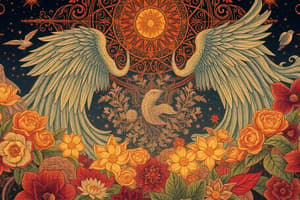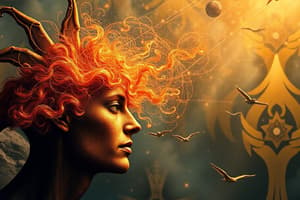Podcast
Questions and Answers
What are the four main goals of psychology?
What are the four main goals of psychology?
- To describe, explain, predict, and control behavior (correct)
- To summarize, develop, forecast, and manage behavior
- To document, clarify, interpret, and enforce behavior
- To observe, analyze, instruct, and regulate behavior
Which of the following best describes the concept of the 'collective unconscious' according to Carl Jung?
Which of the following best describes the concept of the 'collective unconscious' according to Carl Jung?
- A universal reservoir of shared experiences and archetypes (correct)
- A scientific framework for analyzing individual behavior
- A state of awareness regarding one's own thoughts and feelings
- A personal set of memories unique to each individual
Which personality archetype represents the darker aspects of the self that are often repressed?
Which personality archetype represents the darker aspects of the self that are often repressed?
- Shadow (correct)
- Anima
- Persona
- Hero
What component of the 'Me self' includes possessions and affiliations a person identifies with?
What component of the 'Me self' includes possessions and affiliations a person identifies with?
Which archetype is considered the highest because it represents wholeness and completeness?
Which archetype is considered the highest because it represents wholeness and completeness?
What does the 'self-discrepancy theory' refer to?
What does the 'self-discrepancy theory' refer to?
In the context of self-concept, what is the 'real self'?
In the context of self-concept, what is the 'real self'?
Which component of human agency refers to a person's ability to anticipate outcomes?
Which component of human agency refers to a person's ability to anticipate outcomes?
What is the primary focus of Albert Bandura's social cognitive theory?
What is the primary focus of Albert Bandura's social cognitive theory?
What characterizes the 'false self' as described by Donald Woods Winnicott?
What characterizes the 'false self' as described by Donald Woods Winnicott?
Flashcards
Psychology
Psychology
The study of human behavior and mental processes.
Nature-Nurture Controversy
Nature-Nurture Controversy
The debate over whether genes (nature) or environment (nurture) have a greater influence on behavior. Both matter.
Collective Unconscious (Jung)
Collective Unconscious (Jung)
A shared, universal level of unconsciousness, containing ideas and images that all people share.
Archetypes (Jung)
Archetypes (Jung)
Signup and view all the flashcards
The I-Self (James)
The I-Self (James)
Signup and view all the flashcards
Real Self-Concept
Real Self-Concept
Signup and view all the flashcards
Ideal Self
Ideal Self
Signup and view all the flashcards
Self-Efficacy
Self-Efficacy
Signup and view all the flashcards
True Self
True Self
Signup and view all the flashcards
False Self
False Self
Signup and view all the flashcards
Study Notes
Understanding the Self - Lesson 4
- Psyche (Soul): Psychology studies human behavior and mental processes.
- 4 Goals of Psychology: Describe, explain, predict, and control human behavior.
- Nature vs. Nurture: Both influence behavior, with genetically inherited factors and environmental/social interactions playing significant roles.
- Feminine Side of Men (Animus): Men can have illogical and irrational thoughts.
- Masculine Side of Women (Anima): Archetypes related to fertility and destruction.
- The Wise Old Man: Wisdom and meaning, symbolizing existing knowledge.
- The Hero Archetype: Unconscious images of figures who conquer evil.
- The Self: Highest form of archetype, representing wholeness and completeness.
Carl Gustav Jung
- Analytical Psychology: A theory suggesting certain phenomena influence everyone's lives.
- Collective Unconscious: Part of the unconscious mind containing universal ideas and patterns.
- Archetypes: Ancient/archaic images derived from the collective unconscious.
Archetypes
- Persona: Social mask we present to the world.
- Shadow: Represents our repressed, negative qualities.
- Anima: Irrational mood and feelings.
William James
- Theory of Self: Distinguishes between the "I" self (Pure Ego) and the "Me" self (empirical self).
- I (Pure Ego): Self that understands who we are and what we've done.
- Me (Empirical Self): Separate object/individual, refers to ourselves and our experiences.
- Me Self Components: Material self (belongings), social self (interactions), spiritual self (inner values/identity).
Self-Concept/ Self-perception
- Real Self: Our perception of who we are currently.
- Ideal Self: Our desired version of ourselves.
- Ideal Self-Concept: A model of the ideal person.
- Self-Discrepancy Theory: The gap between ideal and actual selves can influence outcomes.
- Actual Self: Our traits and attributes as perceived by others.
- Ought Self: Traits and attributes we should possess based on societal expectations.
- True Self: Genuine and spontaneous part of ourselves.
- False Self: Mask we display to comply with expectations.
Social Cognitive Theory (Albert Bandura)
- Self-Efficacy: Belief in one's capabilities to perform certain behaviors.
- Modeling: learning by observing others.
Other areas covered
- Ecological Self
- Confucianism
Studying That Suits You
Use AI to generate personalized quizzes and flashcards to suit your learning preferences.




